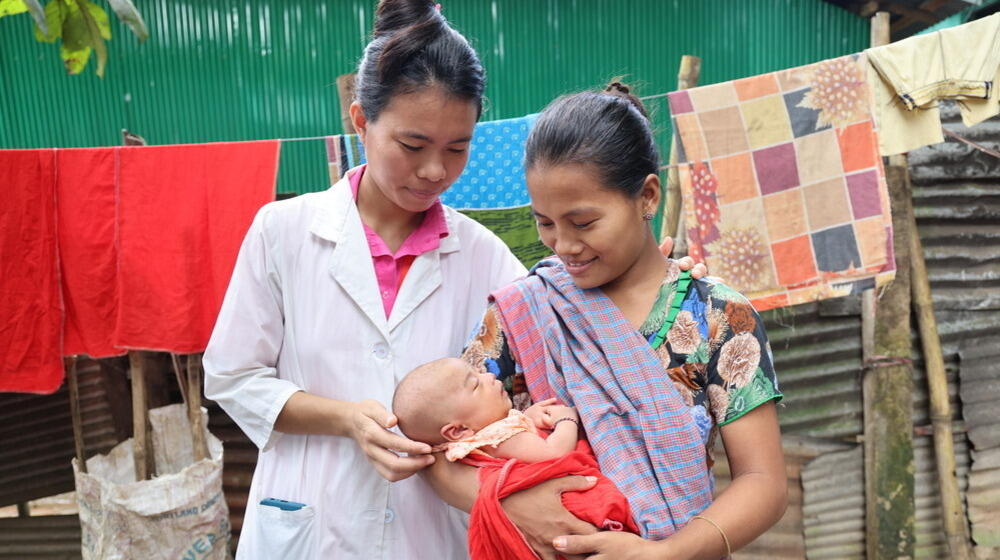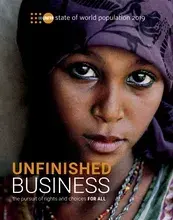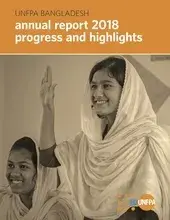"Even in my pregnancy, I couldn't find a moment of privacy and comfort to attend to my needs. Eventually, I had no choice but to use open spaces."

"When the rain seemed endless, I felt the pains of labour pain and I was afraid," shared La Menu, who had recently given birth to her first born.
"The floodwater had taken my neighbours' homes, mere steps away. Somehow, I reached a clinic where I safely gave birth with the assistance of a midwife. During those trying times, I received a simple yet invaluable baby kit from the hospital, which included a blanket, a mosquito net, and sanitizer, among other essentials. These seemingly small items made a world of difference for both me and my first born."

Photo: UNFPA Bangladesh/Alka Ferdous
The catastrophe left scars on the land and its people. An elderly man from an affected area in Bandarban struggled to comprehend the sudden and unpredictable shifts in the climate.
"We are deeply rooted in this land, with no other place to call home. Never in all my years did I witness such a devastating flood. Just a season ago, we were battling the cold; now, the rise in temperatures has become unbearable, worsening with each passing day. Our agricultural lands lie in ruin and we struggle to understand the reasons behind these changes.”

Photo: UNFPA Bangladesh/Alka Ferdous
Ching Marma, a 17-year-old adolescent girl residing in Kuhalong Union in Bandarban, had dreams of becoming an athlete cyclist and dedicated most of her time to cycling. Now, things have changed. With her house reduced to rubble, she spends her time looking after her family’s livestock and what belongings they could recover, instead of training.
"Never in my life have I felt so vulnerable. During the worst of the flooding, I had to go far from my house to use a neighbor's restroom. The nights, in particular, were terrifying, with no electricity to light my way and no mobile network," she shared. Ching Marma expressed her happiness with receiving a Menstrual Health Management kit soon after the flood, - "The very helpful kit made me feel empowered and gave me choices I didn’t have previously. I could manage my hygiene without much worries."
Photo: UNFPA Bangladesh/Alka Ferdous
Like Ching Marma, countless adolescent girls and women have been facing multiple challenges due to the flash flood. Of the total 1.3 million people affected, half were women and girls. Many found themselves displaced, seeking temporary shelter along the roadside. These vulnerabilities significantly heightened the life-threatening risks faced by women and girls, including pregnant women and older people who struggle to move.
In addition to the challenges of accessing basic necessities and crucial life-saving services, this dire situation also amplified the potential for gender-based violence, exposing women and girls to various forms of exploitation.
In response to the crisis, UNFPA Bangladesh distributed a total of 3,630 dignity kits, 1,000 menstrual health management kits and 380 baby kits to women and adolescent girls affected by the flood. The kits included life-saving essential items and menstrual health supplies, offering support and information to safeguard them from the risks of gender-based violence. More life-saving support is needed to help these affected women and girls regain their resilience and rebuild their lives.
This unprecedented flood is a stark reminder of our planet's current climate crisis. According to climate change projections, locations like Bandarban can expect more frequent and intense periods of rain in the coming decades, and the communities affected have no choice but to accept this new reality – that their homes, livelihoods, and families are no longer secure without adaptation. With support from Australia, UNFPA was able to respond swiftly, delivering prepositioned emergency kits to meet immediate needs and protect women and adolescent girls like Popy Day, La Menu, and Ching Marma from health threats and the potential for gender-based violence.
As Bandarban recovers, UNFPA is working to better support affected communities by scaling up its humanitarian response and increasing its adaptive capacity to a new normal, including more investment in disaster preparedness.





